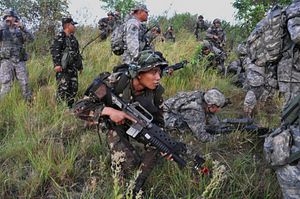Over the weekend, the armed forces of the United States and the Philippines conducted a joint civil assistance activity as part of preparations for a newly named bilateral military exercise that will take place soon. The drills, which are officially set to begin in early October, are part of an effort by the two treaty allies to continue their defense cooperation in spite of challenges faced under the leadership of Rodrigo Duterte (See: “Why the Philippines’ Rodrigo Duterte Hates America”).
As I have noted before, despite all the focus on Duterte’s fierce anti-American rhetoric, his bark was always far worse than his bite. That applies to U.S.-Philippine defense ties too, where have seen more of a downgrading rather than a full-blown severing (See: “Will Duterte End the US-Philippine Military Alliance?”).
On the exercises front more specifically (which, it is worth emphasizing, is only one part of any bilateral defense relationship) Duterte has in fact so far agreed to keep most of what was in the U.S.-Philippine defense relationship, though some assault exercises and bilateral drills had been canceled and other engagements were also refocused on fields like humanitarian assistance and disaster relief, counterterrorism, and counter narcotics (See: “How Much Can Duterte Wreck the US-Philippine Military Alliance?”).
An example of this was witnessed earlier this year when, following the cancelation of the Philippine leg of the CARAT exercise between the two allies, they kicked off the first iteration of a new exercise under Duterte termed a “Maritime Training Activity” called Sama-Sama. As I noted then, despite the change, the focus was on a similar list of common security concerns by both sides – including sea smuggling, maritime domain awareness and patrols, and humanitarian assistance and disaster relief – and the engagement saw a roughly similar level of participation from U.S. assets. We even saw a coordinated bilateral patrol in the Sulu Sea, which was testament to the adaptability of military exercises in the face of political change (See: “What’s With the New US-Philippines Sulu Sea Patrols Under Duterte?”).
Another example of this is the U.S.-Philippine Amphibious Landing Exercise (PHILBEX), the last of which took place from October 4 to 12 last year before it was canceled by Duterte. PHILBEX has traditionally consisted of various phases, with recent iterations including a command post exercise, field training exercises, amphibious operations, combined arms training, civil-military operations, and humanitarian and civic assistance projects. PHILBEX has also been viewed by both sides more broadly as preparing them for the annual bilateral Balikatan exercise, which has traditionally been the biggest war game between them (See: “How Significant is the 2017 US-Philippines Balikatan Military Exercise?”).
Though PHILBEX will not take place this year, a new exercise called KAMANDAG will. The designation KAMANDAG, an acronym for the Tagalog phrase “Kaagapay Ng Mga Mandirigma Ng Dagat,” which translates in English roughly to “Alongside the Warriors of the Sea,” is meant to highlight the partnership between the Filipino and United States militaries.
KAMANDAG 2017 will officially take place from October 2 to 11. According to the U.S. military, it will focus primarily on enhancing counterterrorism and humanitarian assistance and disaster and relief capabilities, as well as other humanitarian and civic assistance projects.
But ahead of the official start of the exercise, both sides have already begun some joint civil assistance activities considered a preparatory part of the exercise. Over the weekend, U.S. Marines and Sailors with the 3d Marine Expeditionary Brigade (3d MEB) alongside their Armed Forces of the Philippines military counterparts conducted a groundbreaking ceremony on the renovation of several schools and a day care center in Casiguran.
According to the U.S. Embassy in the Philippines, the two sides were focused on engineering and construction projects at three different sites in Casiguran. In addition to building new classrooms and canteens and updating electrical wiring, U.S. military medical teams also taught basic lifesaving skills, disease prevention, and dental hygiene to a group of almost 600 Girl Scouts while in Casiguran as well.

































